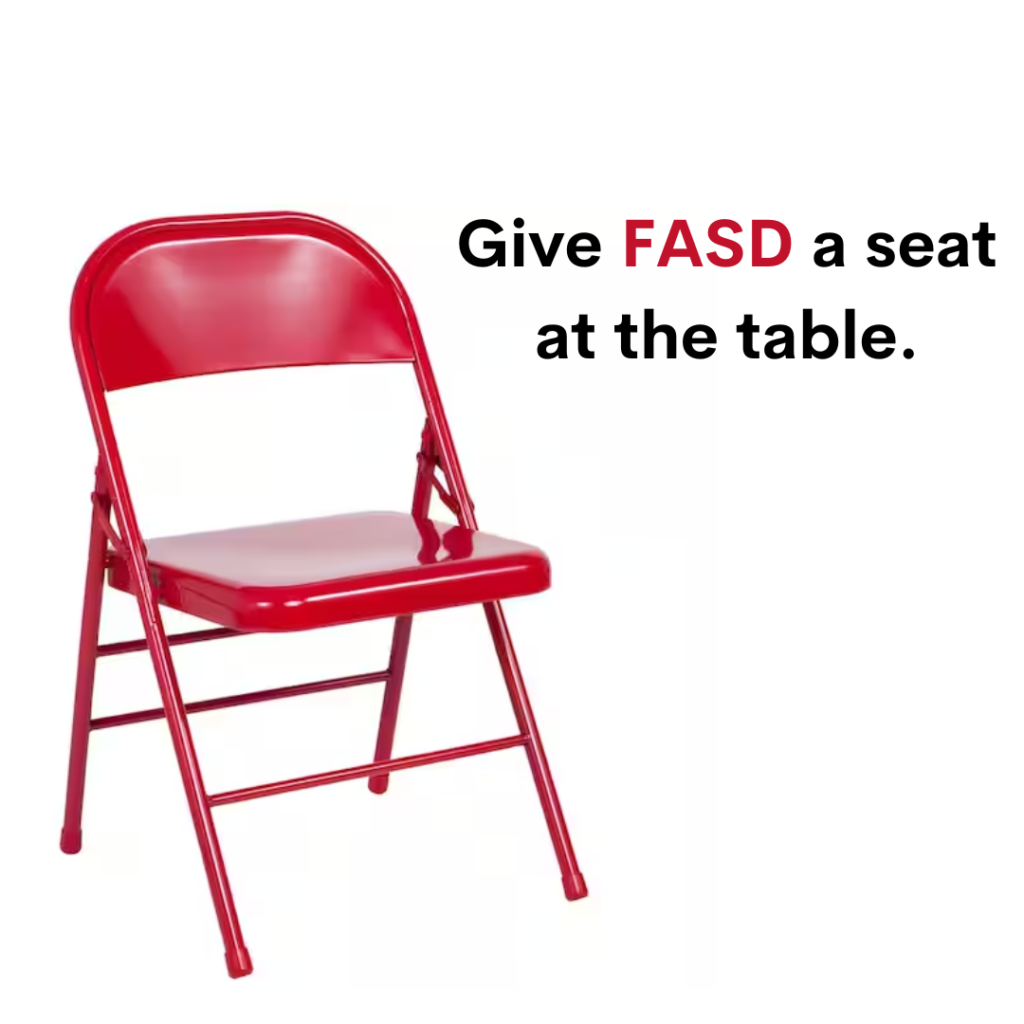
People with FASD have always had a seat and voice at different tables, but just as the disability itself can be non-apparent, so too can the seats. Giving FASD a seat at the table is not just about demanding that FASD be included, but also about the steps we as a movement take to get FASD those seats at various tables.
Learn More About Different Tables & Saving Seats

Image Description: A mustard yellow folding chair
FASD United is currently trying to enact federal policy, which will build the foundation for change.
Learn more about The FASD Respect Act (S. 1800 / H.R. 3946)
Policy plays a crucial role in addressing the multifaceted needs associated with FASD. By establishing comprehensive and inclusive policies, we ensure that individuals with FASD receive the support, services, and accommodations they need to thrive.
Effective policies should encompass various areas, such as:
- Early intervention strategies
- Diagnostic services
- Prevention efforts
- Access to specialized healthcare
- Educational accommodations
- Community support programs
- Legal considerations
- Reducing stigma
By integrating FASD-informed policies into various sectors and giving FASD a seat at the table, we can work towards creating a more inclusive and supportive environment for individuals and families.

Image Description: A lime green folding chair
Check out FASD United’s Fact Sheet for “What Educators Should Know about FASD and PAE.”
We also have a section on our Tools for Parents & Caregivers page related to education under “Resources for Educators.”
In the realm of education, it’s imperative to recognize the importance of including FASD in discussions and decision-making processes. Potentially overlooked or misunderstood, FASD and the way they’re addressed often impacts a student’s learning experience and overall academic success.
Effective educational strategies should encompass things like:
- IEPs/PLPs/504s
- Consistent routines
- Clear expectations
- Visual schedules
- Multi-sensory learning
- Social skills development
- Emotional regulation support
By giving FASD a seat at the table in educational settings, educators, administrators, and policymakers can better understand the unique needs of students with FASD and implement informed strategies to support learning and development. This fosters a more inclusive and equitable educational environment where every student has the opportunity to thrive.

Image Description: A white folding chair
Check out our strengths-based “Yes I Can” and “Yes I Am” initiatives.
Discover what strengths-based research explores about those with FASD.
Explore Interviews we have conducted with neurodiverse individuals and/or those who support them.
FASD intersects with the concept of neurodiversity, which recognizes and celebrates the diversity of human brains and minds. Individuals with FASD have unique neurodevelopmental profiles that may impact cognitive, behavioral, and social functions. Embracing neurodiversity:
- Acknowledges both the strengths and challenges associated with FASD
- Highlights the importance of understanding and supporting individuals with diverse neurological differences.
By adopting a neurodiversity-informed approach, we can promote acceptance, inclusion, and empowerment for individuals with FASD, fostering a society that values a wide variety of human experiences and abilities.

Image Description: A light blue folding chair
Ask about available healthcare resources for someone with FASD.
Take the BRAIN-Online Assessment.
Discover what the CDC’s National Partner Network organizations are doing to promote FASD healthcare.
Individuals with FASD may require specialized medical care that addresses their unique neurodevelopmental and behavioral needs. For example:
- Speech and Language
- Memory & Executive Functioning
- Sensory Processing
- Routine Checkups
- Preventative Care
- Support Services
Healthcare providers play a crucial role in diagnosing FASD, providing early intervention services, and coordinating comprehensive care plans. Educating healthcare professionals about FASD is essential for accurate diagnosis and support.
Collaborative health efforts and raising awareness can promote early identification and enhance healthcare services. Thereby improving outcomes and quality of life for individuals with FASD.

Image Description: A reddish-orange folding chair
Learn more about the disability space from those with living experience.
Read our interview with Dr. Eric Flake about developmental disabilities.
Ask the Family Navigators how to go about finding and accessing disability resources.
Explore rights under the Americans with Disabilities Act (ADA).
As a disability, FASD presents a range of unique effects across various domains, including cognitive, behavioral, social, and adaptive functioning. Individuals with FASD may experience difficulties with executive functioning, impulse control, memory, attention, and social interaction. These may impact areas related to disability like:
- Neurodevelopmental challenges
- Daily functioning
- Social and behavioral difficulties
- Education
- Employment
- Access to services & necessity of supports
FASD and disability are interconnected in various aspects of life for individuals with prenatal substance exposure. Recognizing and addressing these intersections is essential for providing effective disability support and promoting the well-being of individuals with FASD and PSE.

Image Description: A light pink folding chair
Check out our Interview with FASD-informed officer Captain Brian Holloman.
View our “What the Justice System Should Know” fact sheet.
FASD intersects with the justice system, presenting potential challenges for individuals with PSE. Due to cognitive and behavioral challenges associated with FASD, individuals with PAE are overrepresented in the justice system, face higher rates of arrest, incarceration, and involvement in criminal activities compared to the general population. Why?
- Difficulties understanding legal proceedings
- Communication challenges with legal professionals
- May find themselves in the wrong place at the wrong time
- May make potentially incriminating statements due to confabulation
- Panic mixed with executive function disparities may lead to incriminating action (ex: running, difficult towards police).
- Comprehension of consequences
It should be noted that people with FASD are statistically more likely to be the victims of a crime. Thus, it is essential for legal professionals, including judges, lawyers, and law enforcement officers, to receive education and training on FASD to recognize its impact and implement appropriate accommodations and interventions.
Providing specialized support and diversion programs tailored to the needs of individuals with FASD can help reduce recidivism rates and promote rehabilitation and reintegration into the community.

Image Description: A purple folding chair
Professionals can become more FASD-informed at the International FASD Research Conference (yearly).
Check out our Tools for Parents and Caregivers site for resources and guidance.
People with FASD may encounter unique complexities related to their neurodevelopmental condition, such as difficulties with learning, behavior regulation, and social interactions. These can impact their experiences within the child welfare system, from placement stability to educational support and access to appropriate services. FASD and child welfare services intersect in:
- Foster care and adoption
- Social work
- Child protection cases
- Educational advocacy
- Medical services
- Transition to adulthood
- Preventative efforts
It’s essential for child welfare professionals to have a thorough understanding of FASD to provide tailored support and interventions. By promoting awareness, implementing evidence-based practices, and collaborating with multidisciplinary teams, child welfare agencies can better meet the needs of individuals with FASD and ensure their well-being and success within the child welfare system.

Image Description: A mint green folding chair
Learn more about mental wellness for those with FASD and read our Self-Care Interview with the ALC FASD Changemakers.
Explore important research done on FASD and mental health
Flannigan, K., Coons-Harding, K. D., Anderson, T., Wolfson, L., Campbell, A., Mela, M., & Pei, J. (2020).
FASD is intricately connected to mental health, as individuals with FASD often experience a range of psychological and emotional complexities. Individuals prenatally exposed to alcohol may be at increased risk for mental health conditions such as:
- Anxiety disorders (generalized, social, separation)
- Depressive / Mood disorders
- Attention deficit hyperactivity disorder (ADHD)
- Conduct disorder
- Learning disorders
These conditions can co-occur with FASD and exacerbate its symptoms in areas such as impulse control, emotional regulation, social interaction, and adaptive functioning. Additionally, the stigma and lack of understanding surrounding FASD can contribute to feelings of isolation, low self-esteem, and frustration for individuals.
It’s essential for mental health professionals to have an awareness of FASD and its connection to mental health in order to provide accurate diagnosis, appropriate interventions, and holistic support for individuals with FASD to promote their overall well-being and quality of life.

Image Description: A sunset orange folding chair
View our FAQs on prenatal alcohol exposure to learn more.
Contact our free, anonymous, Family Navigators regarding pregnancy health.
Join the Recovering Mothers Anonymous support group.
The intersection of FASD and healthy pregnancy underscores the critical importance of promoting prenatal alcohol exposure prevention and maternal health support. FASD is preventable by abstaining from alcohol during pregnancy, which emphasizes the need for comprehensive education and support for pregnant or planning to become pregnant* individuals. Promoting healthy pregnancies:
- Involves not only avoiding alcohol and other substances, but also ensuring access to prenatal care, nutrition, and mental health support.
- Empowers expectant parents with knowledge about the risks of alcohol consumption during pregnancy
- Provides resources for maintaining overall well-being,
- Supports the health and development of future generations
Additionally, healthcare providers play a crucial role in screening for alcohol use, providing counseling, and connecting pregnant individuals with appropriate support services to ensure the best possible outcomes.
*It should be noted that not every person plans to become pregnant and may use alcohol prior to recognition of pregnancy. Rather than perpetuating stigma towards birth mothers who consumed alcohol, approach healthy pregnancy through the lens of equitable education, support for those living with FASD, and care for pregnant individuals.

Image Description: A navy blue folding chair
Download FASD United’s Polysubstance Use card (coming soon) for more information.
Contact our Family Navigators to seek support, ask questions, and be directed to substance use support.
Explore what the Centers for Disease Control and Prevention (CDC) says about substance use disorders.
The intersection of substance use and FASD highlights the complex relationship between maternal health behaviors and fetal development*. Prenatal alcohol exposure is the leading cause of FASD, however, FASD can also co-occur with other substance use disorders, such as tobacco, illicit drugs, and prescription medications. This is referred to as Polysubstance Use Disorder (PUD). Substance use during pregnancy can:
- Exacerbate the neurodevelopmental effects of prenatal alcohol exposure
- Lead to increased risks of birth defects and developmental challenges
- Heighten individuals with FASD’s vulnerability to substance use disorders later in life
Addressing the intersections of substance use and FASD requires a comprehensive approach that includes prevention, early intervention, and support services for both pregnant individuals and individuals with prental substance exposure (PSE).
*It should be noted that not all pregnant people birthing individuals with FASDs have substance use disorders. As noted above, the relationship between maternal and child health is complex, which is why we are asking that FASD be given a seat at numerous kinds of tables.
